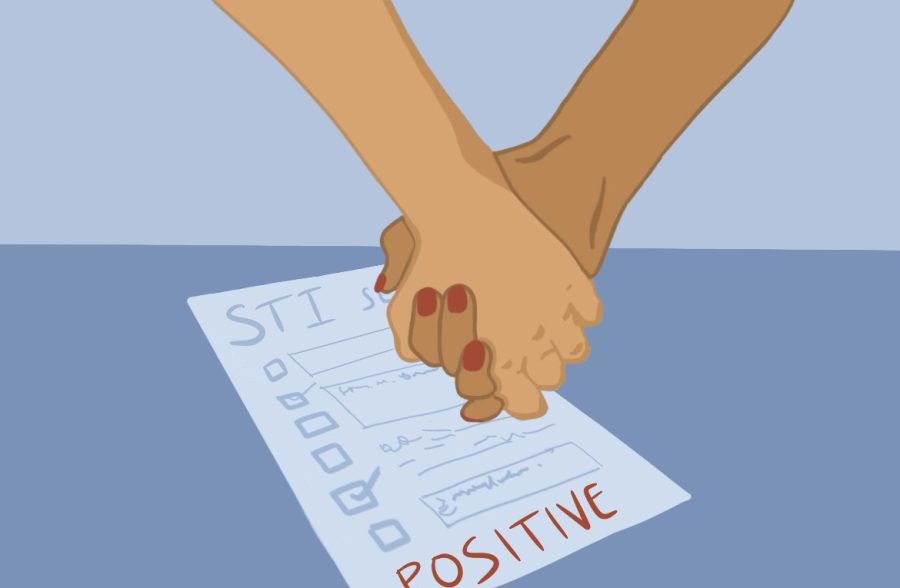STI secrecy is not hot
March 27, 2023
Receiving the text that someone you previously slept with has been exposed to a sexually-transmitted infection, or testing positive for one yourself, is never a good feeling.
However, you’re not alone. About one in four college students have an STI, according to a fall 2010 report by Washington and Lee University.
Yes, they are that common—and so are the stigmas assigned to them.
When I found out that I had been exposed to chlamydia, my heart dropped. I felt so alone, like I had done something wrong. The word “slut” kept bouncing around my head.
I wanted to take back my actions, cry, scream or do anything that would express my frustration. I felt dirty, irresponsible and disappointed with myself.
This was all due to STI stigma. I agree that STIs are not good because, at the end of the day, they are infections.
However, they are treatable and common enough that they do not need to be considered taboo and people do not need to be shamed into keeping quiet about them.
Staying quiet about STI exposure is what perpetuates the stigma—no one is encouraged to talk about their own experience with STIs. What many do not realize is how common they are.
If more people shared their experiences about STIs, there would be less fear about how they might be perceived.
The labels that are put on those who have them is part of what keeps people from being open about their diagnoses. People are made to feel that they did something wrong or that they are dirty. This was exactly how I felt receiving that message.
Over half of the U.S. population will have an STI in their lifetime, according to a Feb. 18, 2020 study from the Kaiser Family Foundation.
I knew all of this, though, even before I received that text. I thanked the person for letting me know and got tested the next day.
It came back positive.
I felt embarrassed by this. My face got hot and I started crying. I didn’t know what to do, so I did what I always do: I went to the gym and I just so happened to get my personal record that day, even in the face of the stress.
My best advice in this type of situation is to do an activity that you find calming and that you can use to recenter yourself.
I didn’t tell my mom out of fear she would think of the word “slut” or that she would be disappointed in me. I didn’t want her to think about me like that. I actually didn’t tell any of my family until I decided to write about my experience for this column.
Nearly one in four people won’t seek out treatment or testing for an STI from their healthcare provider if they are on a parent’s insurance, according to the CDC.
There is so much fear regarding confidentiality that people are not getting treated for their infections. Luckily for UVM students, there are over 16 free STI screening facilities in the greater Burlington area, according to Safer STD Testing.
Then came the next step in this endeavor: reaching out to past partners. There were people I had to contact that I really did not want to talk to, especially about the fact that I tested positive for chlamydia, and that they might have it, too.
My experience contacting these people is what inspired me to write this column.
While I thought it was a no-brainer to contact previous partners in lieu of my diagnosis, I found out some people don’t bother saying anything at all. The responses I received were less angry, as I anticipated, and more thankful that I said anything at all.
After asking, I received stories of people testing positive for an STI but not contacting past partners. Most likely they had the same fears as me: what people will think of them, breaking a period of no-contact or just general embarrassment.
Had I not been told about my exposure, I would have never known to get tested. Many STIs present themselves asymptomatically, according to the Mayo Clinic.
I find it unbelievable that some people do not contact previous partners if they test positive for an STI. Not only is that dangerous, it’s a weak mentality.
Letting your past partners know about an exposure or diagnosis is the most responsible and courteous thing you can do in that situation. The fear of perception is what holds so many people back.
However, it is still not justifiable to keep something like this a secret from those who are at risk of infection.
I had to use a website to send an anonymous text because I had someone blocked. There are no excuses for not reaching out.
To me, it also doesn’t make sense that more people aren’t reaching out. Around 110 million Americans are infected with an STI at any given time, according to the CDC.
If so many people have one, there needs to be less stigma about STIs being something one needs to cover up or keep quiet about.
I also wrote this column for anyone afraid to get tested or embarrassed that they just tested positive for an STI. I’ve been there, and it’s really okay.
If you have people in your corner, go to them for support.
And if you are really nervous about contacting past partners, go to this anonymous outreach website to inform them—complete with a fun little GIF when you send a text.
